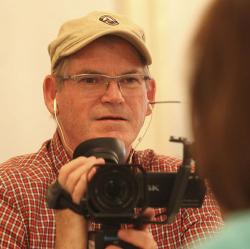When I first met Jesse Slokum, he was known as “Peter Rabbit.” He was the guy wearing a beanie propeller hat, dancing to the music of a band in Dunn Meadow or at The Bluebird. Asher Benrubi, the singer in Pure Funk (the band I worked with in the fall of ’71), would see Peter in the crowd and from the stage would call out: “Ladies and gentlemen, put your hands together for Peter Rabbit, the star of the movie Woodstock.”
I later found out Peter Rabbit was indeed in the Academy Award-winning documentary about the three-day music festival in August 1969 that drew 400,000 people to Max Yasgur’s farm outside of Bethel, New York. Richie Havens was the first performer in the film. During his “Freedom” medley, Havens encourages the crowd to “clap your hands … clap your hands …” and the film cuts to a shot of one lone person standing, dancing, and turning to the crowd. As the camera zooms out, the entire mass of people reacts, gradually standing and clapping their hands. It was a magical moment in the film. That dancer, who encouraged everyone to stand, get involved, and “clap your hands,” was Peter Rabbit, a.k.a. Jesse Slokum.
Busking 4 Freedom
Forty-eight years after Woodstock, I caught up with Slokum as he was busking at the corner of East Kirkwood and North Grant Street in downtown Bloomington. Busking can be any act of public performance for tips. Jesse has been busking for more than 40 years, and, after performing around the country, he always seemed to find his way back to Bloomington, to what he calls “my home base.”
This day, on that Kirkwood corner, T-shirts bearing the phrase “Busking 4 Freedom” are proudly on display and for sale. It’s a reflection on the moment this happy dancer connected with Richie Havens and the crowd at Woodstock. “I’m a busker,” Slokum says, “and because of this song in that audience segment response, I’m associated with freedom in the minds of countless hundreds of millions of people, and even after I’m gone, it’ll still be the same.”
Peter “Colic”?
I could call this next section “the ballad of Jesse’s names.” Slokum explains: “My father was a Croatian immigrant, and he naturalized in a recruiting office in New Jersey and he spelled out his name K-O-L-I-C, which, I found out eventually from a retired Slavic languages professor here at Indiana University, should be pronounced ‘Kohl-eetch.’ But the sergeant at the induction center … looked at what Dad had written, ‘K-O-L-I-C.’ He just said ‘colic’ and Dad accepted that. He never told us it should be ‘Kohl-eetch.’ So do I have to explain why a guy who fell in love with American folk music didn’t want to be Peter ‘Colic’?”
Peter Kolic was not one to volunteer his last name, so in 1968 someone added “Rabbit” after his first name, and it stuck. He began calling himself “Peter Rabbit,” and that’s what everyone knew him as whenever he came to Bloomington. Then, in 1977, when he started writing songs, he decided not to copyright songs as “Peter Rabbit.” That’s when he officially changed his name to Jesse Slokum, “because it sounded … really American to me and I wanted to come up with something that a folksinger would have.”
Slokum feels that singing on street corners around America has allowed him to find his voice. “I got to write and learn the songs that I’ve been meant to sing,” he says.

